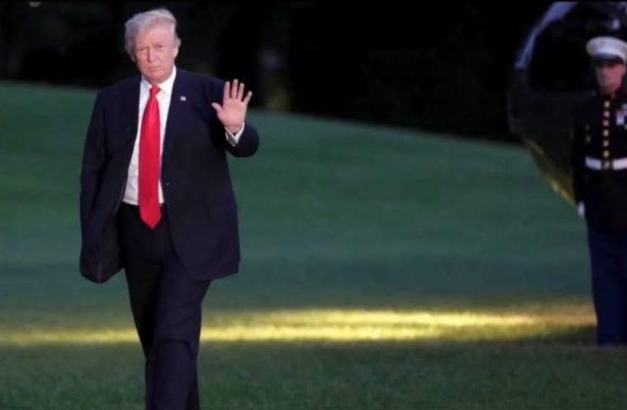Former President Donald Trump made headlines Saturday with a dramatic announcement: U.S. military forces had carried out a high-stakes strike on what he called a “drug-carrying submarine” in the Caribbean Sea. According to Trump, the mission destroyed the vessel, killed two suspected narco-terrorists, and captured two others, who remain in U.S. custody. He framed the operation as a significant victory in the ongoing fight against transnational drug trafficking networks funneling fentanyl and other narcotics into the United States.
Trump personally pushed for the release of the mission’s footage, posting it on Truth Social alongside a statement calling the strike “a major victory for the American people” and a warning to anyone transporting illegal drugs toward the U.S.
The submarine, as described by Trump, was a purpose-built narco-sub — the type cartels use to transport tons of narcotics while remaining mostly submerged. These vessels are engineered to evade detection, slip through patrols, and outrun traditional boats. Trump claimed the sub carried fentanyl and “other deadly narcotics,” estimating the mission may have prevented up to 25,000 overdose deaths.
The released video showed thermal and aerial images of the long, shadowy vessel cutting through rough seas before precision munitions struck, erupting in smoke, debris, and waves. The footage circulated quickly across social media and news outlets, including Fox News. Trump underscored the message: “If you traffic poison into the United States, your time is up.”
Pentagon officials remained reserved publicly. Defense sources confirmed the operation was part of a broader anti-narcotics campaign launched last month, involving the Navy, Coast Guard, and CIA intelligence. The sub likely left Venezuela days prior, tracked along known trafficking routes before commanders approved the strike.
The two survivors were rescued by U.S. Navy personnel and are held aboard a U.S. warship. While their identities remain confidential, Trump said they are foreign nationals connected to a South American cartel. Secretary of State Marco Rubio confirmed they are providing intelligence on trafficking routes and cartel logistics.
The timing comes amid America’s ongoing fentanyl crisis, which continues to devastate families nationwide. Synthetic opioids are now the leading cause of death for Americans aged 18–34. The political urgency around stronger action against drug smugglers and foreign cartels has intensified across party lines.
Trump has consistently highlighted fentanyl as a central campaign issue, portraying cartels as more deadly to Americans than foreign militaries. Republican lawmakers have echoed this rhetoric; in 2023, Rep. Marjorie Taylor Greene proposed the death penalty for anyone convicted of smuggling fentanyl into the U.S. While the bill didn’t pass, it underscored the political momentum.
The Caribbean has become a hotspot for trafficking. This latest submarine strike marks the sixth major interdiction since operations intensified last month. With land routes in Central America under stricter scrutiny, traffickers increasingly rely on semi-submersible vessels from Colombia or Venezuela. These subs sit low in the water and are notoriously hard to detect, making each interception strategically significant.
Defense officials described the mission as a “precision strike in international waters with full legal authority.” Meanwhile, the Pentagon acknowledged B-52 bombers conducted a “show of force” near Venezuelan airspace as a warning to cartel allies and paramilitary groups. Trump also confirmed expanded CIA activity in the region, signaling a growing U.S. counter-narcotics footprint.
Trump’s announcement was aggressive: “This isn’t just about drugs. It’s about sovereignty, safety, and defending our people. These are narco-terrorists, and they will be treated accordingly.”
Critics remain skeptical. Some say Trump’s overdose prevention estimates are speculative. National security analyst Rachel Stein noted that while it’s impossible to quantify deaths prevented by one strike, such operations do disrupt trafficking networks. Progressive groups warned that increased U.S. military activity in the Caribbean could destabilize the region, advocating diplomacy and economic reforms over military action.
The Biden administration has stayed mostly silent, reportedly concerned about a lack of coordination with Trump’s team. However, with the footage dominating media coverage, any public criticism could carry political risk.
Trump’s base has embraced the operation as evidence of decisive leadership. The visuals — resembling a military thriller — serve as effective political messaging. Analysts have noted the campaign optics, even among centrists who acknowledged the footage’s impact.
As of Sunday, details about the suspects and total narcotics destroyed remain limited. Pentagon officials continue to analyze the wreckage, and intelligence from the survivors may guide further operations.
Trump concluded with a pointed warning: “The United States will never surrender to the cartels. We will hunt them, stop them, and destroy their operations wherever they hide — by land, air, or sea.”
Whether seen as necessary or risky, the strike sent a clear, forceful message, precisely as Trump intended.
